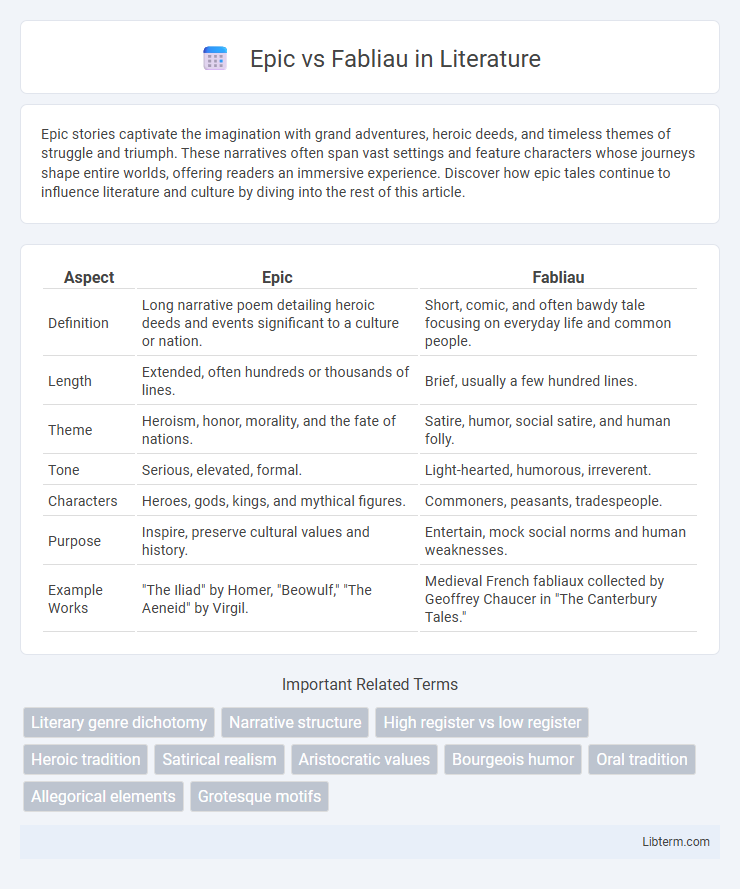Epic stories captivate the imagination with grand adventures, heroic deeds, and timeless themes of struggle and triumph. These narratives often span vast settings and feature characters whose journeys shape entire worlds, offering readers an immersive experience. Discover how epic tales continue to influence literature and culture by diving into the rest of this article.
Table of Comparison
| Aspect | Epic | Fabliau |
|---|---|---|
| Definition | Long narrative poem detailing heroic deeds and events significant to a culture or nation. | Short, comic, and often bawdy tale focusing on everyday life and common people. |
| Length | Extended, often hundreds or thousands of lines. | Brief, usually a few hundred lines. |
| Theme | Heroism, honor, morality, and the fate of nations. | Satire, humor, social satire, and human folly. |
| Tone | Serious, elevated, formal. | Light-hearted, humorous, irreverent. |
| Characters | Heroes, gods, kings, and mythical figures. | Commoners, peasants, tradespeople. |
| Purpose | Inspire, preserve cultural values and history. | Entertain, mock social norms and human weaknesses. |
| Example Works | "The Iliad" by Homer, "Beowulf," "The Aeneid" by Virgil. | Medieval French fabliaux collected by Geoffrey Chaucer in "The Canterbury Tales." |
Defining Epic and Fabliau
An epic is a lengthy narrative poem that celebrates heroic deeds and events significant to a culture or nation, often featuring noble characters and elevated language. In contrast, a fabliau is a short, humorous, and often bawdy tale rooted in medieval French literature, characterized by its focus on everyday life, clever tricks, and satirical tone. Epics emphasize grand themes of honor and valor, while fabliaux highlight wit, social critique, and the lives of common folk.
Historical Origins of Epic and Fabliau
Epics originated in ancient oral traditions, with roots in civilizations such as Mesopotamia, Greece, and Rome, serving as lengthy narrative poems that celebrated heroic deeds and historical events. Fabliaux emerged in medieval Europe during the 12th and 13th centuries, characterized by short, comic, and often ribald tales that reflected the social realities of the urban middle class. While epics were closely tied to the preservation of cultural identity and collective memory, fabliaux functioned as satirical reflections of contemporary life and social norms.
Core Themes and Motifs
Epic narratives center on themes of heroism, valor, and the struggle between good and evil, often portraying legendary figures and grand quests that highlight cultural ideals and moral virtues. Fabliaux emphasize everyday life with motifs of trickery, satire, and sexual humor, focusing on the follies and vices of common people through witty, irreverent storytelling. Both genres explore human nature but from contrasting perspectives: epics through noble deeds and fabliaux through comedic, often subversive, social commentary.
Structural Differences
Epics are characterized by a grand, formal structure with lengthy, elevated verse and a clear, linear narrative often divided into multiple books or cantos. Fabliaux are short, humorous tales written in simple, straightforward verse, usually structured around a single episode or incident with a punchline or moral at the end. Epics emphasize extended descriptions, heroic deeds, and genealogies, while fabliaux prioritize brevity, wit, and everyday satire.
Social and Cultural Contexts
Epics often reflect aristocratic values and heroic ideals within hierarchical societies, emphasizing themes like honor, bravery, and the divine right of rulers. Fabliaux, emerging during the medieval period, present a more subversive and satirical view of social norms, highlighting the lives and schemes of common folk with humor and critique of clergy and nobility. These genres illustrate contrasting social and cultural contexts: epics uphold established power structures, while fabliaux expose everyday human folly and social tensions.
Characterization in Epic vs Fabliau
Epic characters embody heroic qualities with noble lineage, supernatural abilities, and a clear moral purpose, often representing idealized virtues and larger-than-life personas. Fabliau characters are typically common folk portrayed with earthy realism, wit, and exaggerated flaws, emphasizing everyday human foibles and social satire. The characterization in epics serves to inspire and uphold cultural ideals, whereas fabliaux use vivid, often comic character traits to critique societal norms.
Language and Style Comparison
Epic narratives employ elevated, formal language featuring elaborate metaphors and extended similes to convey grandeur and heroic themes. Fabliaux utilize colloquial, straightforward language with humor and irony, employing concise and accessible vocabulary to engage common audiences. The stylistic contrast highlights epics' emphasis on nobility and timelessness versus fabliaux's focus on satire and everyday social scenarios.
Moral Perspectives and Satire
Epics often portray moral perspectives rooted in heroism, honor, and societal values, emphasizing clear distinctions between good and evil to uphold cultural ideals. Fabliaux employ sharp satire to critique social norms, highlighting human folly and hypocrisy through humor and irony, often subverting traditional moral frameworks. The contrast lies in epics reinforcing moral lessons, while fabliaux use satire to expose and question the morality of everyday life.
Notable Examples from Literature
The epic genre features towering works like Homer's *Iliad* and *Odyssey*, as well as Virgil's *Aeneid*, which showcase heroic narratives with grand themes of honor and fate. In contrast, notable fabliaux such as the anonymously authored *The Miller's Tale* from Geoffrey Chaucer's *Canterbury Tales* highlight bawdy humor and everyday characters in short, satirical stories. These distinct examples illustrate epic tales' focus on mythic heroism versus fabliaux's emphasis on clever, ribald storytelling rooted in medieval French culture.
Influence on Modern Storytelling
Epic tales shape modern storytelling by establishing archetypal heroes and grand adventures, influencing genres like fantasy and historical fiction through complex narratives and moral lessons. Fabliaux contribute to contemporary storytelling with their sharp satire, comedic twists, and focus on everyday characters, inspiring modern humor and short story formats. These contrasting narrative styles enrich the diversity of plot structures and character development techniques found in current literature and media.
Epic Infographic

 libterm.com
libterm.com